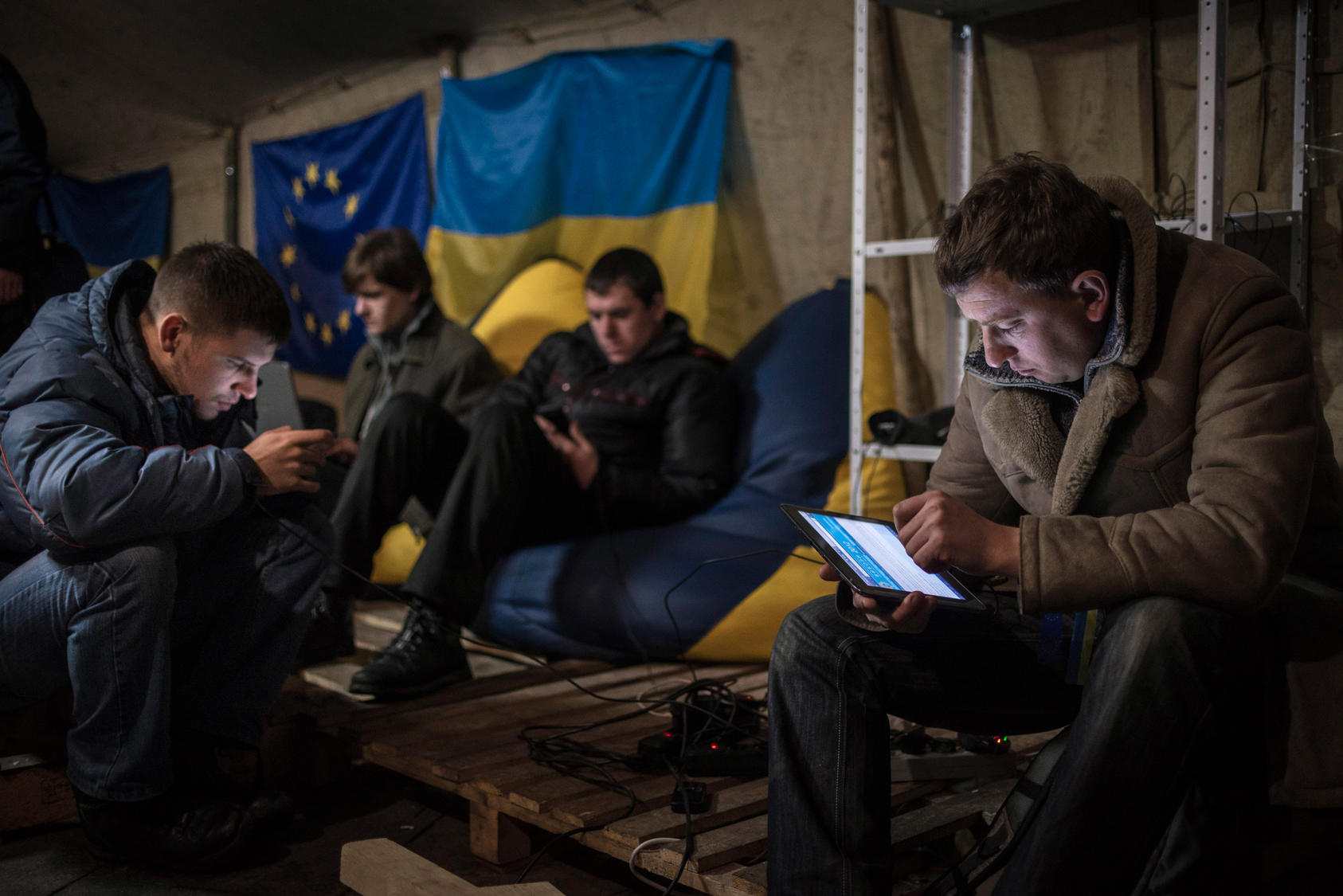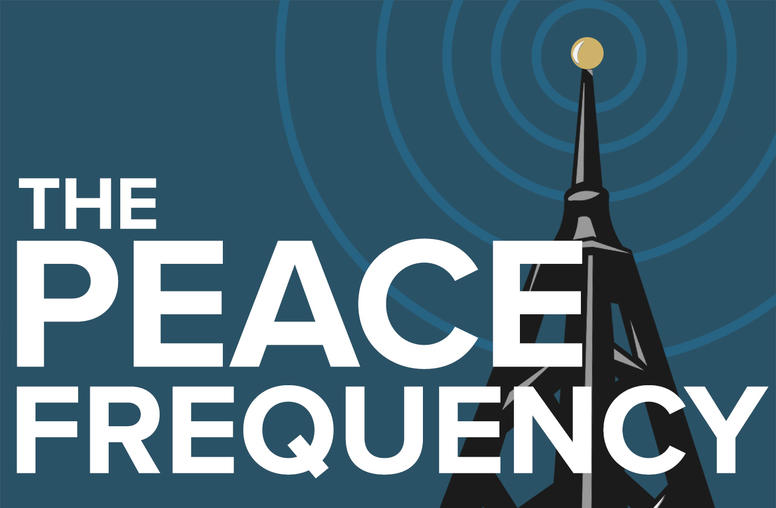Working at the intersection of technology, media, and data to devise effective means of reducing violent conflict around the globe

Country Projects
Iraq
TechCamps for PeaceBuilding
TechCamps are two-day workshops intended to help peacebuilders in conflict zones integrate relevant technology tools into their work. The first three of these TechCamps will be held in Iraq (Baghdad, Erbil, and Basrah), with follow-on to occur in other countries as opportunities present themselves. The Iraq workshops will focus on using technology to assist Iraqi NGOs in their efforts to improve citizens’ access to information and open government.
Television Reality Show: Peace Media for Iraqi Youth
USIP is helping to highlight and address the many challenges faced by Iraqi youth by producing a multi-media peacebuilding program called Salam Shabab (Peace Youth). Three full seasons feature over 140 Iraqi youth from all across the country competing in a series of peacebuilding challenges. The television series is backed by a growing online community on Facebook and on salamshabab.com. Salam Shabab has earned international acclaim by being awarded the UNESCO Prize for Intercultural Dialogue at the children’s programming competition, Prix Jeunesse, in March of 2012.
Preventing Media Incitement in Iraq
As part of an initiative to mitigate media incitement to violence in Iraq, USIP continues to work directly with Iraqi media regulatory officials, civil society media monitoring organizations, and news directors and reporters from across the broadcast sector in Iraq. Following a series of workshops for the development of self-regulatory tools, USIP has coordinated the formation of a media monitoring network of Iraqi civil society representatives to act as an independent and reliable source of analysis on the Iraqi media environment.
Burma
Media and Conflict Assessment
Recent moves to open Burma’s political system have created fertile ground for free speech and a pluralistic media sector to take root, while also posing risks if effective structures are not put into place. USIP is therefore implementing the Intended-Outcomes Needs Assessment (IONA), a methodology, developed by USIP, that will provide guidelines for interviewing a diverse range of Burmese stakeholders to evaluate the media sector and its intersection with potential drivers of conflict.
South Sudan
Radio for Peace in South Sudan
USIP is working with local partners to produce a curriculum-based radio drama series that will be tailored to address specific drivers of conflict. In a country marred with conflict after the 2012 referendum, radio programing can be a valuable tool for peacebuilding, as radio enjoys a wider audience than both television and newspaper media combined. The radio drama will utilize education through entertainment to attract the large youth population and promote messages of peace and tolerance.
Afghanistan
Innovative Radio Drama for Social Change
USIP is working with local partners to produce a curriculum-based radio drama series, which will address the challenges of dealing with Afghanistan’s informal and formal judicial sectors. USIP has also established a social media network through a group SMS services for coordinating and enhancing the work of the volunteer legal advocates.
Media Support for Change Agents
USIP is using broadcast media, social media, and open data services to assist citizens, media, civil society, elections actors and other groups to experience relevant and credible elections, as part of a longer term transition and reconciliation process. USIP is supporting a national civic dialogue using local radio town-hall broadcasts to surface and highlight the diversity of issues that national organizations need to address in the elections, transition and reconciliation processes. To the same end, USIP has developed an open-data platform to provide elections-focused-organizations with timely and relevant data to support evidence-based decision-making through the 2014 and 2015 electoral cycles, including for media election reporting.
Pakistan
Analyzing Extremist Messages in the Media
By working with local Pakistani organizations on a comprehensive content analysis initiative, USIP will produce a detailed analysis of the volume and nature of traditional and social media coverage of violence employed to achieve social and political goals, especially violence employed by militant groups. The aim is to find a common ground among local Pakistani partners on next steps to counter extremism in local media.
Other Major Initiatives
The PeaceTech Lab
USIP is developing the concept of a PeaceTech Lab that would be located in its new headquarters at the northwest corner of the National Mall. It would be dedicated exclusively to developing technology to mitigate the causes of conflict and promote peacebuilding. The Lab concept draws on the experience of other innovation laboratories and incubators, in that it will seek to bridge the world of ideas with practical problems faced in the field.
Roundtable on Technology, Science & Peacebuilding
The National Academy of Engineering and the U.S. Institute of Peace have established a Roundtable on Technology, Science and Peacebuilding to make a measurable and positive impact on conflict management, peacebuilding, and security capabilities. The principle goals of the Roundtable are: (a) to accelerate the application of science and technology to the process of peacebuilding and stabilization, (b) to promote systematic, high-level communication between peacebuilding and technical organizations on the problems faced and the technical capabilities required for successful peacebuilding, and (c) to collaborate in applying new science and technology to the most pressing challenges faced by local and international peacebuilders working in conflict zones.
Data Sharing for Peacebuilding
This project seeks to fashion systems for data collaboration among the diversity of local and international agencies engaged in shaping peaceful outcomes in particular locales. The initial emphasis is on the sharing of information and analysis of physical and social factors that may indicate high levels of risk for political stress and violence. The beneficiaries of the project will be those on the ground, especially local authorities, who have the capacity to directly act on these stresses given sufficient warning, or those who can diffuse them through diplomatic or financial channels, with an emphasis on coordinated and timely action.
Blogs & Bullets
Through this initiative, USIP explores ways to utilize new analytical tools to understand the power of online discourse to both promote and prevent conflict. USIP has put on five major conferences, three in Washington D.C. (July 2010, September 2011, October 2012) and two at Stanford University (February 2011, April 2013). These meetings have brought together a wide range of leading academic and industry experts to evaluate the Arabic, Russian and Persian language blogospheres and conduct research into the role of new media in contentious politics. The events were held in partnership with George Washington University, Harvard University’s Berkman Center for Internet & Society, and Morningside Analytics. USIP has produced two papers that laid out a conceptual framework for analyzing the impact of new media on conflict.
Smart Tools for Smart Power
USIP’s “Smart Tools for Smart Power” initiative brings together peacebuilding practitioners and technology innovators to identify high-impact opportunities for technology to bolster peacebuilding and stability operations. To date, USIP has spearheaded reviews of the value and challenges associated with three promising platforms:
- Mobile Phones and Peacebuilding
Mobile phone technologies are the subject of considerable enthusiasm in the peacebuilding sector, yet little has been done to evaluate systematically the factors of success or failure in conflict environments. In 2010, USIP brought together experts on peacebuilding and mobile phone technology to focus on the use of mobile phones in one of the most difficult conflict environments today: Afghanistan. USIP published a follow-up report in November, 2010. In 2012, we conducted the first-ever mobile phone-based nationwide survey in Afghanistan via SMS and interactive voice response (IVR). - Crisis Mapping
The 2010 earthquake in Haiti presented disaster relief experts with unique challenges, for which open-source crisis mapping platforms like Ushahidi offered new solutions. USIP worked with experts from USIP’s Haiti Working Group to provide support to Ushahidi in Haiti and to capture the lessons learned from its work in a Special Report . USIP has also been a consistent supporter of the annual International Crisis Mapping Conferences. - Serious Games and Simulations for Peacebuilding
In 2009, USIP partnered with 3D Security, Lockheed Martin, and USIP’s Center for Education and Training to focus attention on an area of technology that has seen great advances in recent years, but which remains underutilized by the conflict resolution community: simulations and serious games.
Universities 4 Ushahidi
In June 2011, USIP conducted the “Universities for Ushahidi” (U4U) training program. The week-long program brought together 11 young people from conflict zones around the world – including Iraq, Afghanistan, Sudan, Egypt, Kenya, Haiti, and elsewhere – training them in the use of crowdsourced mapping tools like Ushahidi as well as in the skills of conflict management. Equipped with these skills, trainees have used mapping technologies to assess local community needs in the run-up to Kenya’s recent elections, to prevent gender-based violence in Haitian slums by working with community leaders to determine the placement of new solar-powered lights, and to report and prevent crime in Liberia, among other projects.
Media as Global Diplomat
In partnership with Independent Television Service, USIP produced a series of summits to highlight the expanding power of today’s media to transform public diplomacy and promote peaceful international relations. These events have been hosted by influential public figures such as Ted Koppel and Queen Noor. The next summit, scheduled for February 2013, is entitled “Media that Moves Millions,” and will take a deep dive into the unprecedented phenomena we have seen in the last few years of user-generated media campaigns that have inspired masses.
Exchange 2.0
This project explores how access to international study and cultural exchange could be broadened by combining new media with cross-cultural dialogue. Through a series of events and publications, USIP and partner organizations are working to better understand and develop technology-enabled programs embedded in curricula and with a cross-cultural educational purpose that will improve the number, diversity, and experience of international exchange participants.
Resources & Tools
Peacemedia is an Initiative-run repository for peacebuilding multimedia aimed at connecting educators, students, and those working in the field of conflict prevention and peacebuilding. To visit PeaceMedia online, go to http://peacemedia.org.
Weekly News Roundup
In June 2010, USIP began producing News Roundups, weekly emails that aggregate the latest developments in Media, Science and Technology relevant to the peacebuilding community as well as showcase additions to PeaceMedia. These roundups are now sent to over 10,000 subscribers. To sign-up for the Weekly News Roundups, visit http://www.usip.org/newsletter-signup
Media Assessment Template
The Intended-Outcomes Needs Assessment (IONA) methodology was created by USIP to provide a template for the assessment of the media landscape in conflict situations. IONA offers a clear and concise process for evaluating the opportunities and challenges of producing peacebuilding programming in fragile states, thereby providing a critical connection between its integration with peacebuilding planning and impact evaluation. The Template was field-tested in Afghanistan and is being implemented in Burma.
Guiding Principles for Evaluation of Media in Conflict
USIP, in coordination with the Annenberg School for Communication at the University of Pennsylvania, the Broadcasting Board of Governors, Internews and Fondation Hirondelle devised guidelines for evaluating the impact of media programs in conflict areas. The principles were were the result of a multi-day meeting of funders, methodologists and implementers that was held in Caux, Switzerland December 2010.





